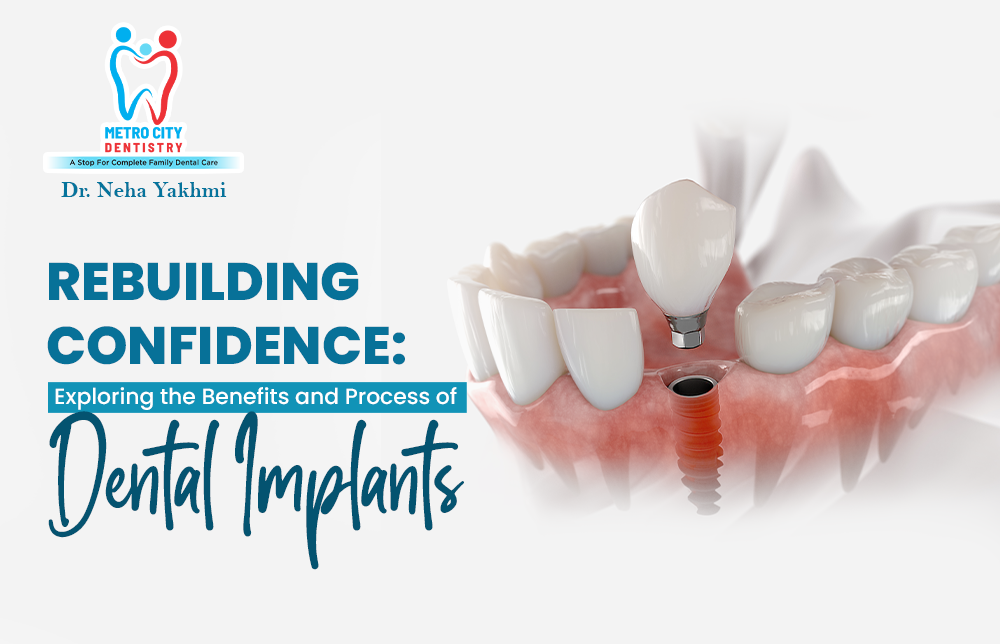
In the realm of modern dentistry, dental implants have emerged as a revolutionary solution for restoring smiles and enhancing oral health. Whether you’ve lost a single tooth or several, dental implants offer a permanent and natural-looking replacement that can significantly improve your quality of life. In this comprehensive guide, we’ll delve into the benefits and process of dental implants, empowering you with the knowledge you need to make informed decisions about your oral health.
What are Dental Implants?
Dental implants are artificial tooth roots made of biocompatible materials such as titanium. They are surgically implanted into the jawbone to provide a stable foundation for replacement teeth, such as crowns, bridges, or dentures. Unlike traditional dentures or bridges, which sit on the gums or adjacent teeth, dental implants integrate with the jawbone, mimicking the natural structure of a tooth and providing unparalleled stability and functionality.
Benefits of Dental Implants:
- Improved Appearance: Dental implants look and feel like natural teeth, restoring your smile and facial aesthetics. With dental implants, you can regain the confidence to smile, speak, and eat without worrying about gaps or discomfort.
- Enhanced Oral Health: Unlike traditional tooth-supported bridges, dental implants do not require adjacent teeth to be altered or compromised. This preserves the integrity of your remaining teeth and promotes better long-term oral health.
- Durability and Longevity: With proper care and maintenance, dental implants can last a lifetime. They are designed to withstand the forces of chewing and biting, providing a durable and reliable solution for tooth replacement.
- Improved Speech and Eating: Dental implants function just like natural teeth, allowing you to speak and eat with confidence. Unlike removable dentures, which can slip or cause discomfort, dental implants provide a stable and comfortable foundation for chewing and speaking.
- Bone Preservation: When a tooth is lost, the underlying jawbone can begin to deteriorate over time due to lack of stimulation. Dental implants stimulate the jawbone, preventing bone loss and preserving facial structure.
The Dental Implant Process:
Initial Consultation: The dental implant process begins with a comprehensive consultation with your dentist or oral surgeon. During this appointment, your dentist will evaluate your oral health, discuss your treatment goals, and determine if you are a candidate for dental implants.
- Treatment Planning: If dental implants are deemed suitable for your needs, your dentist will create a personalized treatment plan tailored to your unique circumstances. This may involve dental imaging, such as X-rays or CT scans, to assess the condition of your jawbone and surrounding structures.
- Implant Placement: The next step in the dental implant process is the surgical placement of the implant fixture into the jawbone. This procedure is typically performed under local anesthesia to ensure your comfort. Once the implant is placed, a healing period of several months is required to allow the implant to fuse with the surrounding bone in a process called osseointegration.
- Abutment Placement: Once osseointegration is complete, a small connector called an abutment is attached to the implant fixture. The abutment serves as the foundation for the final restoration, such as a crown, bridge, or denture
- Restoration: The final step in the dental implant process is the placement of the restoration onto the abutment. This may involve a custom-made crown for a single tooth replacement or a bridge or denture for multiple teeth. The restoration is carefully crafted to match the size, shape, and color of your natural teeth, ensuring a seamless and natural-looking result.
Post-Procedure Care:
Following the placement of dental implants, it’s important to follow your dentist’s instructions for post-procedure care to promote healing and ensure the long-term success of your implants. This may include practicing good oral hygiene, avoiding hard or sticky foods, and attending regular follow-up appointments with your dentist.
Conclusion:
In conclusion, dental implants offer a transformative solution for individuals seeking to restore their smiles and improve their oral health. With their numerous benefits and high success rates, dental implants have become the gold standard for tooth replacement. If you’re considering dental implants, schedule a consultation with our dentist to learn more about how this innovative treatment can help you regain confidence in your smile and enjoy a lifetime of improved oral health.


